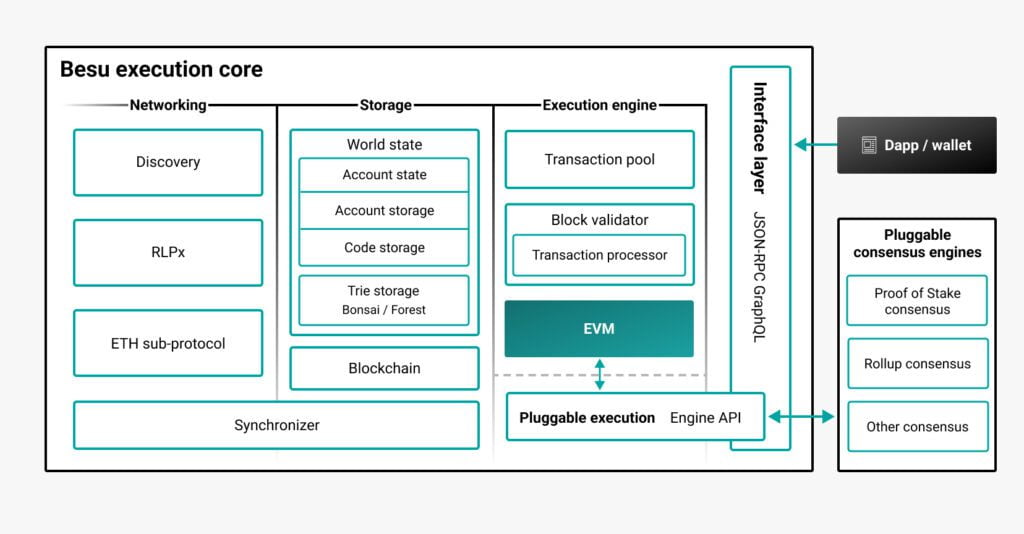Introduction
In the ever-evolving landscape of blockchain technology, Hyperledger Besu has emerged as a powerful and versatile open-source Ethereum client. With its innovative features and robust capabilities, it has garnered significant attention from developers and enterprises alike. This article delves into the intricacies of Hyperledger Besu, its unique attributes, and its role in shaping the future of decentralized applications and enterprise blockchain solutions.
What is Hyperledger Besu?
Hyperledger Besu is a prominent open-source Ethereum client that enables developers to build decentralized applications (dApps) and implement enterprise blockchain solutions with unparalleled flexibility and scalability. As part of the Hyperledger initiative, Besu aims to provide a robust and feature-rich platform that caters to diverse use cases within the blockchain ecosystem.

Key Features of Hyperledger Besu
Ethereum Compatibility
Hyperledger Besu stands out due to its seamless integration with the Ethereum ecosystem. It is fully compatible with the Ethereum Virtual Machine (EVM) and supports the execution of Ethereum smart contracts. This compatibility enables developers to leverage existing tools, libraries, and knowledge while building on the Besu platform.
Permissioning System
One of Besu’s defining features is its sophisticated permissioning system. It allows network participants to define access controls and permissions, making it suitable for both public and private blockchain networks. This feature ensures that data visibility is maintained according to the requirements of the network participants.
Pluggable Consensus Mechanisms
Besu provides the flexibility to choose from various consensus mechanisms, including Proof of Work (PoW) and Practical Byzantine Fault Tolerance (PBFT). This adaptability makes Besu suitable for different use cases, ranging from public blockchains to consortium networks requiring high throughput and consensus finality.
Privacy and Confidentiality
In the realm of enterprise blockchain, privacy and confidentiality are paramount. Hyperledger Besu incorporates private transactions and permissioned state management, ensuring sensitive business data remains confidential while still benefiting from the advantages of blockchain technology.
Use Cases of Hyperledger Besu
Enterprise Blockchain Solutions
Hyperledger Besu finds its sweet spot in enabling enterprises to adopt blockchain technology for optimizing their operations. It facilitates the creation of private, permissioned networks that can streamline processes, reduce intermediaries, and enhance transparency among stakeholders.
Supply Chain Management
The complexities of modern supply chains can be simplified using Hyperledger Besu. It provides a secure and transparent environment for tracking goods from source to destination, enabling efficient inventory management, authentication of product origins, and real-time updates for all involved parties.
Financial Services
In the realm of finance, Besu can revolutionize how transactions are conducted. It ensures secure, tamper-proof records of financial operations, accelerates settlement times, and reduces fraud by providing an immutable ledger shared across authorized participants.
Public Sector Applications
Government agencies can benefit from Hyperledger Besu by using it to create secure systems for recordkeeping, identity management, and public service delivery. The transparency and security of blockchain technology enhance citizen trust and streamline administrative processes.
Getting Started with Hyperledger Besu
Installation and Setup
Getting started with Hyperledger Besu is relatively straightforward. Developers can follow the official documentation to install the client on their preferred platform, whether it’s for development or production use.
Network Deployment
Besu supports the deployment of both public and private networks. Developers can configure network parameters, including consensus mechanisms and permissioning rules, to create a tailored blockchain network that aligns with their use case.
Smart Contract Development
Developers can write and deploy smart contracts on Hyperledger Besu using familiar programming languages like Solidity. This compatibility reduces the learning curve for Ethereum developers and promotes quicker adoption of the platform.
Advantages and Challenges
Interoperability
Besu’s compatibility with Ethereum and its support for Ethereum Improvement Proposals (EIPs) contribute to its interoperability within the broader blockchain ecosystem. This ensures that applications and solutions developed on Besu can seamlessly interact with other Ethereum-based projects.
Scalability
As blockchain adoption grows, scalability remains a challenge. While Besu offers pluggable consensus mechanisms that can enhance throughput, addressing scalability concerns requires careful network design and architecture.
Learning Curve
While Besu simplifies certain aspects of blockchain development, newcomers to the technology might still encounter a learning curve. However, the vast resources provided by the Hyperledger community and comprehensive documentation mitigate this challenge.

Comparing Hyperledger Besu with Other Ethereum Clients
Geth
Geth (Go-Ethereum) is one of the most popular Ethereum clients. While it’s focused on public Ethereum networks, Besu’s permissioning features make it a stronger candidate for enterprise use cases that require control over access.
Nethermind
Nethermind is another Ethereum client that emphasizes performance and scalability. Besu’s advantage lies in its permissioning system, which caters to a broader range of use cases beyond performance optimization.
Pantheon
Pantheon, now known as Hyperledger Besu, originated within the ConsenSys ecosystem. Its integration into the Hyperledger project has given it a wider scope and positioned it as an enterprise-ready Ethereum client.
The Hyperledger Community
Collaboration and Contributions
Hyperledger Besu benefits from the collaborative efforts of the vibrant Hyperledger community. Developers, researchers, and enthusiasts contribute to the project’s growth by sharing insights, improving code, and fostering innovation.
Future Development
The future holds promising developments for Hyperledger Besu. As blockchain technology continues to evolve, Besu is likely to integrate with Ethereum 2.0 upgrades and further enhance its features to address the evolving needs of enterprises and developers.
Security and Privacy Considerations
Immutable Ledger
Besu’s adherence to blockchain principles ensures that once data is recorded on the ledger, it remains immutable. This feature guarantees the integrity and authenticity of transactions, crucial for auditability and compliance.
Enhanced Data Privacy
Hyperledger Besu’s privacy features enable businesses to handle sensitive data while maintaining privacy. Private transactions and encrypted communication channels enhance data security and confidentiality.
Auditing Capabilities
The transparency inherent in blockchain technology enables robust auditing capabilities. Besu’s traceable and tamper-proof records facilitate audits, making it an attractive choice for sectors where compliance is essential.
Hyperledger Besu and Enterprise Blockchain Adoption
Redefining Business Processes
Hyperledger Besu empowers enterprises to rethink and optimize their business processes. From supply chain management to regulatory compliance, its features can transform the way industries operate.
Consortium Networks
Besu’s permissioning system is particularly useful for consortium networks, where multiple organizations collaborate on a shared blockchain. It ensures that the network’s rules align with the participants’ requirements.
Regulatory Compliance
Industries with strict regulatory frameworks can benefit from Besu’s transparent and auditable nature. It provides a reliable foundation for building systems that meet compliance standards.
Real-World Examples
Trade Finance on Hyperledger Besu
In the realm of trade finance, Besu can simplify complex transactions by providing a secure, traceable, and transparent platform. This reduces the risk of fraud and enhances trust between trading partners.
Streamlining Supply Chains
Hyperledger Besu’s capabilities extend to optimizing supply chain processes. By enabling real-time tracking and authentication, it minimizes delays and ensures the authenticity of products.
Government Recordkeeping
Government agencies can leverage Besu to create secure systems for recordkeeping. The decentralized and tamper-proof nature of blockchain ensures the integrity of critical documents and data.
Championing Decentralization with Hyperledger Besu
Empowering Developers
Besu’s flexibility and compatibility empower developers to create innovative solutions that cater to diverse industries. This can lead to a more decentralized and democratized digital landscape.
Democratizing Access
The open-source nature of Besu democratizes access to blockchain technology. It allows businesses of all sizes to explore and implement blockchain solutions without substantial financial barriers.
Promoting Inclusivity
Besu’s features promote inclusivity by providing a platform that aligns with the needs of various sectors. Its permissioning system and privacy features ensure that different stakeholders can participate in the network.
Future Prospects and Developments
Integration with Ethereum 2.0
As Ethereum transitions to Ethereum 2.0, Besu is likely to integrate with the upgraded network. This could bring about enhanced scalability, security, and efficiency to Besu-powered networks.
Enhanced Consensus Mechanisms
Besu’s pluggable consensus mechanisms provide a foundation for experimenting with new consensus algorithms. This could lead to the development of consensus mechanisms that better suit specific use cases.
Ecosystem Expansion
As blockchain adoption expands, Besu’s ecosystem is expected to grow. More enterprises, developers, and industries are likely to recognize the value of Besu and contribute to its evolution.
Conclusion
In the dynamic world of blockchain technology, Hyperledger Besu shines as an open-source Ethereum client with a versatile range of features. From enabling enterprises to redefine their processes to championing decentralization and inclusivity, Besu’s impact is substantial. As blockchain continues to reshape industries, Hyperledger Besu remains at the forefront, driving innovation, security, and transparency.
Frequently Asked Questions
1. Is Hyperledger Besu suitable for public and private blockchain networks?
Yes, Hyperledger Besu is versatile enough to cater to both public and private blockchain networks. Its permissioning system allows participants to define access controls, making it adaptable to various use cases.
2. What programming languages can I use for smart contract development on Besu?
Developers can use Solidity, a popular programming language for Ethereum smart contracts, to write and deploy smart contracts on Hyperledger Besu.
3. How does Hyperledger Besu ensure data privacy on the blockchain?
Hyperledger Besu incorporates private transactions and permissioned state management to ensure data privacy. This means that sensitive business data remains confidential while still benefiting from blockchain technology’s advantages.
4. What advantages does Hyperledger Besu offer over other Ethereum clients?
Hyperledger Besu stands out with its advanced permissioning system, making it suitable for enterprise use cases that require fine-grained control over access. It also offers pluggable consensus mechanisms for greater flexibility.
5. How can I get started with Hyperledger Besu?
To get started with Hyperledger Besu, you can follow the official documentation to install the client on your preferred platform. From there, you can explore its features, deploy networks, and develop smart contracts according to your use case.
